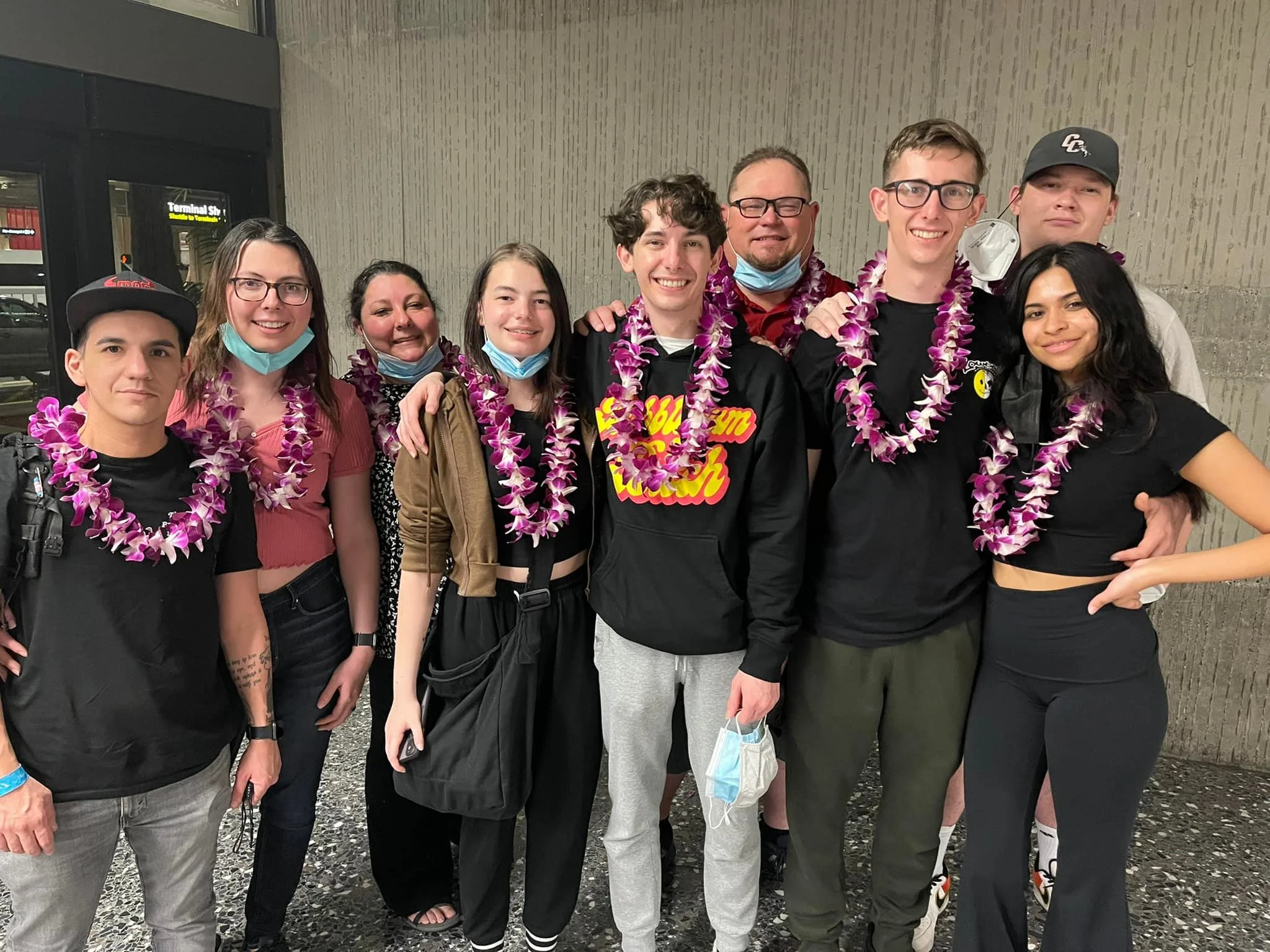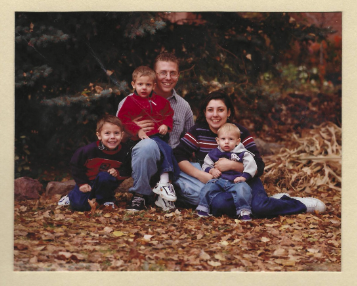Nikki Smithson’s upbringing looked a little different from most of the LDS families who surrounded hers in the pews. In the 1970s, most couples at church were not interracial like her parents, but she has nothing but fond memories of the “great childhood” she experienced and of her “great parents” who are still married (and active in the church today). Nikki was very aware of the controversy mixed-race couples like her parents endured, but she says she has no recollection of learning about the LGBTQ community back then. It was something she was sheltered from, largely because her parents didn’t know too much about it themselves.
Until one day. While at her aunt’s house in her teens, Nikki made a comment about lesbians and watched as her two aunts, Abby and Cindy, gracefully stood up and left the room. Her mom said, “Nikki!” Suddenly 2+2 made sense. Realizing she had lesbian aunts was her only experience with the LGTBQ community until adulthood.
Nikki was sealed in the temple to her high school sweetheart and they had three kids in a row. They bought a house, a Suburban, and as “babies having babies,” almost felt like they were playing house. But quickly, Nikki realized this marriage was one she would need to exit, which proved more difficult than she thought. She was advised by various church leaders that she needed to “stay with her eternal companion.” But Nikki knew she had to make the best decision for herself and her three small children (six years and under); she knew she’d have to navigate this alone.
This experience presented the first cracks in her testimony—not of the Savior, but of church culture. She put her three young boys in Cub Scouts and held callings and “did it all 110% if we couldn’t do it 150%” as a single mom. There were years of inactivity and many Sundays, including every Mother’s Day, where Nikki opted out, unwilling to listen to another lesson about eternal family ideals. Nikki says, “I did what I could to heal and progress forward and not be put in a box where I’d feel fear or judgment. But I always maintained my testimony of Christ.”
Eventually, she married Kurt, who was not a member of the church yet, and “our blended family grew to a total of six boys and one little princess, all under 18 years old at that time.” As her oldest biological child neared puberty, Nikki noticed a constant state of malcontent on their part. There was crying, depression, expressions of wanting to die, and overall, an inability to live an authentic life. Nikki didn’t know what to do, but was willing to explore any measures to help “fix” her child. She says, “Now I know there wasn’t a problem, per se. It was just a matter of discovering the right tools and resources to address their needs.”
The first step for Nikki was to call her ever-so-inclusive aunts, Abby and Cindy, who led her to PFLAG, one of the only LGBTQ support systems at the time near their heavily-LDS Gilbert/Mesa, Arizona hometowns. Nikki went to all the meetings, while Kurt held the fort down with the kids. At PFLAG, the Smithsons were thrilled to find amazing resources and support, though no trans-specific groups. They noticed there were other transgender kids showing up who had no support at all at home. Kurt frequently had to remind Nikki they already had seven kids already, and she couldn’t bring them all home with them.
After finally visiting a pediatric endocrinologist and gender identity counselor (as well as experiencing an affirming Halloween night spent dressed as a female), Nikki’s oldest (AMAB) child understood that their diagnosis of gender dysphoria entailed more–they were trans. Casey was ready to identify as female. The Smithson’s youngest, who was six at the time, was so excited and said, “I have always wanted a sister!!”
Now 15, Casey began her process of transitioning—first working on her pitch through voice lessons, then hormone replacement therapy, and later taking surgical steps to achieve the feminine form that brought her a strong sense of peace with her identity. Almost instantly, while still a teen, her parents noticed an instant sense of confidence and happiness in Casey that had been missing for years. At age 25, @theCaseyblake is now a very vocal leader in the trans community and advocate for other trans youth.
About a year into Casey’s journey, Nikki’s son, Michael, came out to his mom as gay. At 14, he was just starting high school. Nikki replied, “I love you unconditionally, I will support you no matter what. I’m sure I’ll make mistakes, but I’m here for you.” Once again, she turned to PFLAG for support. They advised not to ask too many questions, because sometimes kids don’t know just yet. Nikki says, “I wanted a checklist, wanted to ask, ‘What do you need baby?’ Because his path looked so different from his sister’s. I haven’t been perfect, but we’ve definitely tried to support each other.”
One year later, Nikki’s next biological child, Spencer, came to her and said, “Mom, I need to talk about my sexuality.” Nikki sat down and thought, “Ok. What else do I need to learn? Then, it was the sweetest thing – he was hemming and hawing, and I thought, ‘Baby just tell me, I’m going to love you no matter what.’ And he said, ‘Fine. Mom, I’m straight’.” Nikki laughed and said, “Let me tell you what I told your siblings – I’ve never had a straight son come out to me before, but I am here for you, and support you.’ And I wondered, ‘Where’s the checkboxes to have a straight son? I had no resources for any of these things’.” All this happened in just three short years, when Nikki’s kids were ages 13-15. She says, “I know how to be loud and proud for a trans daughter, a gay son, and now a straight son. We are all happy and living our authentic lives.”
Nikki considers herself a very black and white person. Accepting her kids for who they are came naturally for her, but she was very clear with their friends and family that there would be no level of “grey” tolerance allowed. After Casey first began transitioning, she presented an ultimatum: “You can continue to unconditionally love this child with the Christlike love you’ve always shown, or you can cause problems, stir up hate, and all the kids and I walk together. The choice is yours – run with it or not. It’s ok to have questions and to ask me questions, but don’t address them to my minor child. Come to me. I’ll look up the answers; I’m still learning as well, and I need you to allow that for myself.”
Most of their family chose to show love, and Nikki says that over the years, they have only experienced a few painful hate crime instances in their community. One being when someone drove by Casey at a gas station and yelled a derogatory phrase and threw something at her. The other being when Casey was called out by a security guard after entering the female bathroom at high school with a friend. This was during the height of the transgender bathroom debate, and Casey had been advised to use the gender-neutral nurse’s bathroom in the office. Casey was humiliated by this experience, and never ventured into any bathroom at school again. Nikki became more staunch in her support of Target, one of the first corporations to state that patrons could use whichever bathroom aligns with their gender identity.
Nikki’s family has expanded in love and diversity: Casey’s partner is a trans male, and her gay son, Michael, is polyamorous and has had a partner who continues to perform drag. The Smithsons are outspoken supporters of the drag community in several cities, especially as of late when so much national attention has been thrust toward the St. George, Utah community, in which they now live, due to political debate over HBO’s recent filming of a drag show there. Along with “the most amazing ally couple,” Pam and Gregg, Nikki co-hosts a parent ally group at the St. George Encircle house. Nikki stands united with the LGBTQIA community in their small town and supports several organizations including (but not limited to) Pride of Southern Utah, Mama Dragons, LGBTQ+ Chamber of Commerce, Affirmation, Southern Utah DragStars, Equality Utah, and the family has a side business on Instagram, @OurFamilyDesign, which creates merch for drag performers and other items.
“I have a deep love for the LGBTQ community and I’m passionate about inclusion. We will keep fighting and seeking a fair and just community everywhere, not just St. George. I tell my kids, ‘I want you to be happy, healthy and safe – whatever that looks like for you’,” says Nikki. Her youngest daughter is 16, and “still figuring her authentic self out. I tell her, ‘Whatever it is, just do it and do it well. Be honest, safe, and we’re good.”
Religiously, Nikki has dreaded the question, “Are you LDS?” since she was first a single mom. She recalls, “I knew I’d need to define the religious journey for me and the kiddos. I originally said, ‘Yeah, but don’t judge the church off me or family,’ or, ‘I was raised LDS and kinda’… or ‘I’m kinda inactive’.” But recently, in the last couple years, Nikki has felt more confident saying, “I am unapologetically LDS.” She says this causes people to look at her and think “Ok, do I want to have a meaningful conversation or walk on...”
But Nikki knows, “My Savior’s love has never changed; I’m not worried about my eternal family. Our bishops have been really good to me because I tell them, ‘This is who we are and I choose Christlike love–I don’t have to worry about the whole eternal perspective and who’s sealed to who. I just need to worry about what I’m dealing with now. In my perception, my family is forever because I know we are the same good people. I love our Savior, and I know our God is a just God.”





















